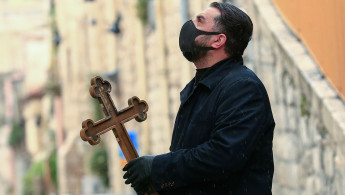In the Christian quarter of Jerusalem's Old City that Bitar calls home, roads are deserted and most shops have been closed for two weeks.
All cultural sites in the Holy Land are shuttered, regardless of their religious affiliation, as authorities seek to forestall the spread of the deadly respiratory disease.
Christians will be prevented from congregating for the Easter service, whether this coming on Sunday - as in the case of Bitar and fellow Catholics - or a week later on April 19 in the case of the Orthodox.
Despite wars and uprisings, the Church of the Holy Sepulchre, built on the site where most Christians believe Jesus was crucified and resurrected, has not been closed over Easter for at least a century, according to Palestinian historian Johnny Mansour.
The Sepulchre is considered the holiest site in Christianity, but Friday's morning mass was celebrated behind closed doors.
Usually thousands mark Jesus's crucifixion on Good Friday with a procession marking the 14 Stations of the Cross, the route Christians believe Jesus walked while carrying his cross before being put to death.
But this year, only four faithful retraced his footsteps under the watchful eye of Israeli police, with the narrow cobbled streets of the old City largely deserted.
Police were out in large numbers monitoring and enforcing the country's strict social distancing rules.
Officers handed out a fine to one journalist who was not respecting the two-metre distancing rule, AFP journalists at the scene said.
Bitar, who is in her sixties, finds it "depressing" she will not be able to celebrate Easter in church.
Israel - which occupied east Jerusalem in the Six-Day War of 1967 and later annexed it in a move never recognised by the internatonal community - has confirmed more than 10,000 coronavirus infections, with 92 dead.
On the Palestinian side, more than 250 cases have been confirmed, with one death.
Jerusalem is usually the vibrant heart of world Easter celebrations.
Last year, more than 25,000 people gathered near the Holy Sepulchre to attend Palm Sunday mass, which marks the start of Easter week.
Online mass
"But despite the difficult circumstances, there can be positives," said Ibrahim Shomali, spokesman for the Latin Patriarchate in Jerusalem.
This Sunday, Easter mass will be broadcast on television and on social networks.
Only six monks will be present in the church, Shomali said.
Watching the mass online will be the only way Francis Gharfah will celebrate Easter this year.
A Palestinian from east Jerusalem, he left his usual decorations in their boxes and chose not to prepare traditional pastries.
|
 |
Everything happens for a reason. I hope that we will be different people, that we will appreciate things differently
- Francis Gharfah, a Palestinian from east Jerusalem |
 |
|
"The situation is dramatic," he told AFP, saying he fears for his job at an NGO due to the virus.
He was "very touched" by the images of Pope Francis celebrating Palm Sunday in an empty Saint Peter's Basilica, accompanied only by a few religious men and women - each of them perched on separate benches.
"People are thirsty for spirituality," said Shomali, who finds great solace in a "return of faith" in this dark time.
Bitar attempts to remain upbeat.
"Everything happens for a reason. I hope that we will be different people, that we will appreciate things differently" once the coronavirus crisis ends.
To mark this Easter, Bitar laid out a cloth printed with small yellow chicks and multi-coloured eggs at the entrance to her home.
Her family has created an improvised photo studio, her daughter and grandchildren squeezing into pictures surrounded by a rabbit and flowers.
But all the photos in the world will not be the same as attending church for Easter.
"We live five minutes from the Holy Sepulchre and we cannot go there," she said sadly.
"It breaks my heart."
Follow us on Facebook, Twitter and Instagram to stay connected







 Follow the Middle East's top stories in English at The New Arab on Google News
Follow the Middle East's top stories in English at The New Arab on Google News
![The UAE is widely suspected of arming the RSF militia [Getty]](/sites/default/files/styles/image_330x185/public/2024-11/GettyImages-472529908.jpg?h=69f2b9d0&itok=Yauw3YTG)
![Netanyahu furiously denounced the ICC [Getty]](/sites/default/files/styles/image_330x185/public/2024-11/GettyImages-2169352575.jpg?h=199d8c1f&itok=-vRiruf5)
![Both Hamas and the Palestinian Authority welcomed the ICC arrest warrants [Getty]](/sites/default/files/styles/image_330x185/public/2024-11/GettyImages-2178351173.jpg?h=199d8c1f&itok=TV858iVg)